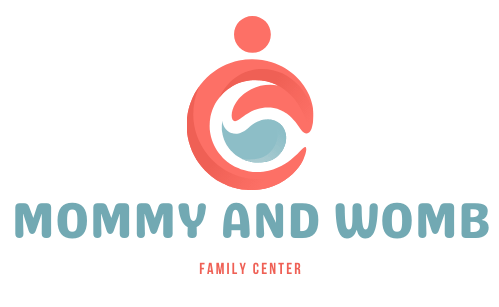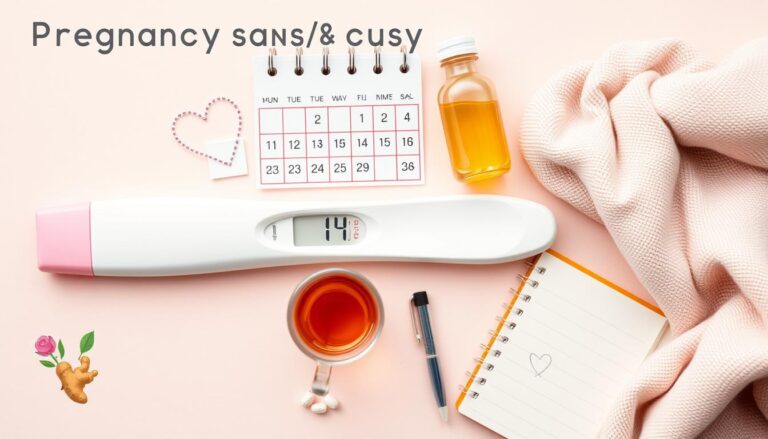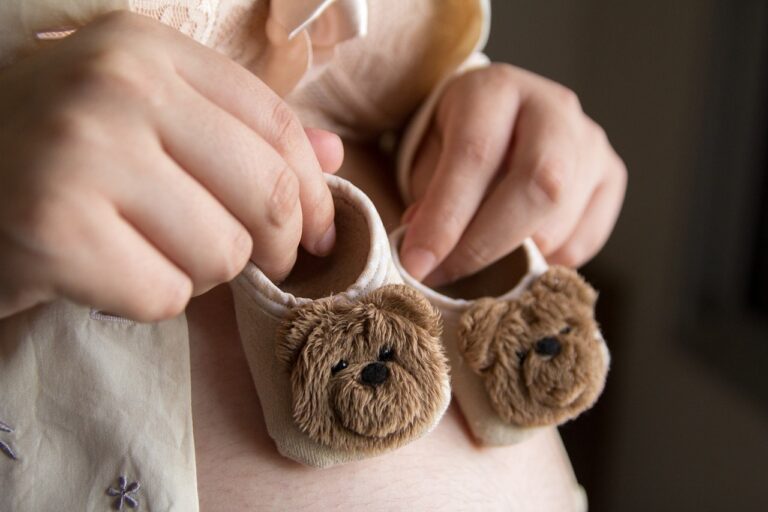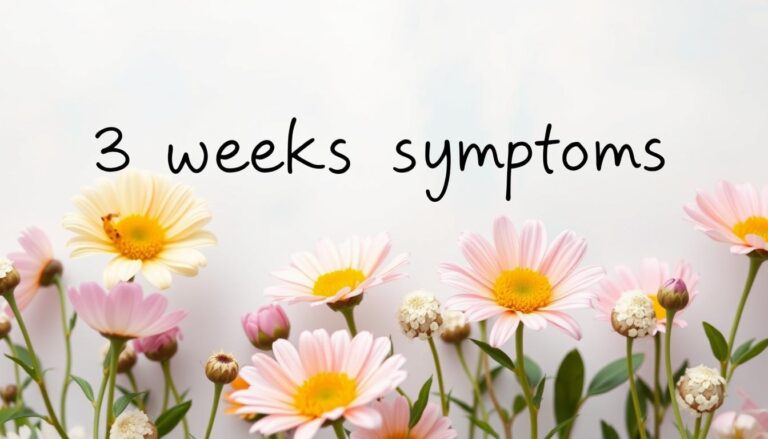Pregnancy – signs and symptoms
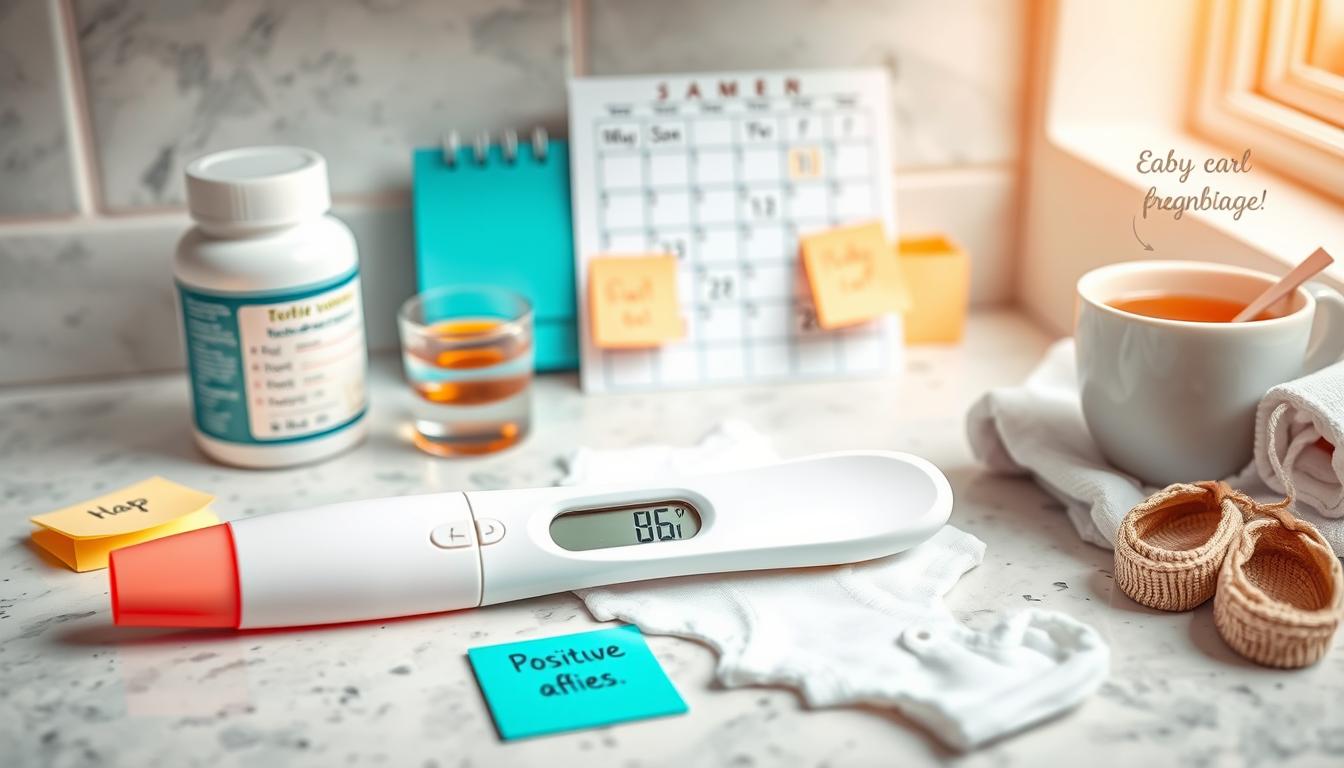
The journey of motherhood starts with small, yet big changes in the body. As you begin this journey, it’s important to know the early signs of pregnancy. These signs, like a missed period or tender breasts, hint that a new life is growing inside1.
Pregnancy brings both joy and uncertainty. Knowing the common early signs can bring clarity and peace. Whether you’re trying to conceive or just curious, learning about these signs empowers you. It helps you make informed choices and seek the right medical care2.
Table of Contents
Pregnancy – signs and symptoms
Missed Period: A Telltale Sign
A missed period is often the first sign of pregnancy3. This happens because the body stops ovulating. The uterine lining also stops shedding each month. But, stress, diet, or hormonal imbalances can also cause irregular periods.
Implantation Bleeding and Light Spotting
Some women may see light spotting or implantation bleeding around 10-14 days after conception3. This happens when the fertilized egg attaches to the uterine lining4. About one-third of pregnant women notice spotting or light bleeding early on3.
Implantation bleeding is usually lighter and shorter than a normal period4. If you see unexpected bleeding or spotting, talk to your healthcare provider. They can check for any other issues.
“Implantation bleeding, usually occurring 10-14 days after conception, is light and common in pregnant women.”
Tender, Swollen Breasts
One of the first signs of pregnancy is tender, swollen breasts. Hormonal changes make your breasts sensitive and bigger5. Breast pain can start as early as one to two weeks after getting pregnant5.
About 1 in 1,000 pregnant women might get breast cancer. So, it’s important to check any new lumps with a doctor5.
In the early weeks, breast pain feels dull and achy5. You might see blue veins and notice darker, bigger nipples5. Bloody nipple discharge can also happen, usually from growing milk ducts5.
Nipple discharge can be creamy white to yellow, green, or brown. It can happen anytime, especially when your nipples are stimulated5.
If you’re feeling breast tenderness and missed your period, talk to your OB-GYN56. Pregnancy symptoms usually start around 4 to 6 weeks. Your breasts might feel tender and bigger during this time6.
Breast tenderness in early pregnancy usually starts around 4 to 6 weeks and lasts through the first trimester7. Breast growth starts around 6 to 8 weeks into pregnancy. Women often notice an increase of a cup size or two throughout pregnancy7.
Remember, breast changes are a common early sign of pregnancy. But, it’s crucial to talk to your healthcare provider to make sure you and your baby are healthy.
Nausea and Morning Sickness
Nausea, or “morning sickness,” is a common symptom in early pregnancy8. It can happen at any time, day or night. Hormones rising quickly are thought to cause it8. Up to 85% of pregnant women feel nauseous, with half also vomiting8. Most women find relief from morning sickness by the second trimester8.
Managing Morning Sickness
Here are some ways to manage morning sickness:
- Eating small, frequent meals
- Staying hydrated by sipping water or sucking on ice chips
- Avoiding triggers like strong smells or fatty/spicy foods
- Taking vitamin B6 or over-the-counter medications like Vitamin B6 or ginger supplements
- Trying relaxation techniques like deep breathing or acupressure
Mild nausea and vomiting are usually safe. But severe cases can cause dehydration and other problems8. If vomiting lasts beyond the 4th month or is severe, see a doctor9.
“Morning sickness affects a vast majority of pregnant individuals, with symptom alleviation typically occurring between weeks 16 to 20.”10
Some factors can make morning sickness worse. These include past nausea, previous pregnancies, carrying twins, or having a female baby8. If home remedies don’t help, see a healthcare provider9. They may do tests to check the severity and impact on the pregnancy9.
Increased Urination Frequency
One of the early signs of pregnancy is needing to urinate more often. This happens because the body makes more blood to support the growing baby. This extra blood means the kidneys process more fluid, which ends up in the bladder11. Women might start feeling the need to pee more as early as weeks after getting pregnant11.
About 8% of pregnant women get a urinary tract infection (UTI), says the Centers for Disease Control and Prevention (CDC)11.
The body’s increased blood supply to support the fetus leads to more urine production11. Doing Kegel exercises can help strengthen muscles and support the bladder during pregnancy11. It’s advised to drink eight to 12 cups of water a day during pregnancy11. On average, people pee between 6 to 7 times a day, but pregnant women might pee more11.
Urinary frequency might ease up in the second trimester, but it usually comes back in the final weeks of pregnancy11. Frequent urination is a normal sign of pregnancy and should go away after giving birth11. Some women might still pee a lot up to six weeks after having a baby11. Most cases of frequent urination during pregnancy don’t need medical treatment unless there are UTI symptoms11.
Frequent urination during pregnancy is a common symptom caused by hormonal and physical changes in the body.12 Hormonal changes early in pregnancy make you need to pee more12. Later in pregnancy, the growing uterus can push against the bladder and bowel, causing more frequent urination12. Weak pelvic floor muscles also contribute to frequent urination during pregnancy12.
Frequent urination is common at every stage of pregnancy.12 Towards the end of pregnancy, it’s common to have trouble emptying the bladder completely and to pee when you cough, sneeze, or lift12. After giving birth, it may take time for pelvic floor muscles to recover, leading to continued increased urination12. Pelvic floor exercises are recommended to strengthen the muscles and support the bladder, bowel, and uterus12.
Frequent urination is one of the most common early symptoms of pregnancy that starts in the first trimester, around week 4.13 Most women find they have increased frequency of urination late in pregnancy, generally from about week 35 onwards13. Nighttime bathroom trips tend to increase throughout the third trimester13. Excessive urination during pregnancy is attributed to the pregnancy hormone hCG increasing blood flow to the pelvic area13.
The blood flow increase to the kidneys during pregnancy due to hCG leads to increased efficiency in waste elimination13. Near the end of the third trimester, the pressure of the growing uterus and the baby’s head dropping down into the pelvis contribute to the increased urge to urinate13. Frequent urination in pregnancy is generally expected to last through the ninth month until childbirth13. If frequent urination becomes excessive or worsens, a doctor may need to assess for a possible urinary tract infection13.

Fatigue and Exhaustion
Fatigue and exhaustion are common in early pregnancy14. The hormone progesterone increases, making you feel very tired. Many moms-to-be need more sleep and feel tired even with simple tasks14. Luckily, this feeling often gets better in the second trimester as your body adjusts14.
Fatigue can start early, even just one week after getting pregnant14. Hormone changes, especially more progesterone, cause this tiredness in the first trimester14. In the early weeks, you might need almost double the sleep you’re used to15.
In later pregnancy, carrying extra weight can make it hard to sleep well16. After 28 weeks, sleeping on your back can increase the risk of stillbirth, so finding a comfy sleeping position is key16. Insomnia is also common, leading to sleeplessness and affecting your well-being16.
To fight fatigue and exhaustion, focus on good sleep habits, drink plenty of water, and do light exercise. Steer clear of caffeinated drinks, take naps, and eat small, balanced meals to stay energized15.
If fatigue suddenly gets worse or makes it hard to do daily tasks, and you have symptoms like fever, chest pain, dizziness, or vision changes, see your healthcare provider right away14.
“The American College of Obstetricians and Gynecologists recommends getting at least 150 minutes of moderate aerobic activity per week during pregnancy to improve energy levels and overall well-being.”14
Other Early Pregnancy Symptoms
Early pregnancy brings more than just missed periods and tender breasts. Women often face a variety of symptoms in the first trimester. These signs are due to the rise in hormones and blood volume at the start of pregnancy.
Food Cravings and Aversions
Pregnancy can change how you feel about food. Many women suddenly crave certain foods and dislike others they used to love17. This is because of hormonal changes and a heightened sense of smell and taste. It’s key to eat well and stay balanced during this time.
Mood Swings and Emotional Changes
Hormonal shifts in early pregnancy can make you feel moody and emotional17. You might feel sad, angry, or anxious without reason. These feelings are normal and come from the quick changes in hormones. Taking care of yourself and talking openly with others can help.
Other symptoms include bloating, headaches, dizziness, constipation, and changes in taste17. These are all linked to the body’s hormonal and physical changes in early pregnancy.
“Pregnancy can be a roller coaster of emotions, and it’s important to be patient and kind to yourself during this time of change and growth.”
When to Take a Pregnancy Test
The best time to take a18 pregnancy test is when you’ve missed your period. Most home pregnancy tests are very accurate19 when used right at this time. Some tests say they can show results before a missed period, but they might not be as sure19.
Timing for Accurate Results
For the most reliable results, wait until at least one week after a missed period to take a pregnancy test19. Your healthcare provider can also order a blood test to confirm pregnancy early, even before a missed period19. The hCG hormone, which tests measure, can be found in urine 6 days after ovulation. But, it usually takes 7-10 days for enough hCG to show up on a test18.
Pregnancy tests are easy to find at pharmacies, drugstores, grocery stores, and even some convenience or dollar stores19. They can cost as little as one dollar, making them affordable for most people19. If you have any worries or questions, always talk to your healthcare provider. They can help figure out the best time to take a pregnancy test and understand the results.
For more information about pregnancy, its symptoms, and everything related to it, please click on the link
https://www.mommyandwomb.com/pregnancy
